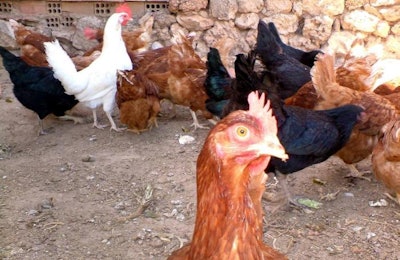
New outbreaks of highly pathogenic avian influenza (HPAI) in poultry have been reported in seven European states over the last week, and two countries – Portugal and the Former Yugoslavian Republic of Macedonia – have detected the virus in wild birds for the first time.
While the H5N8 subtype of the HPAI virus has been detected in the vast majority of cases, other avian flu virus have been confirmed in France, Germany and Greece. Russia has not reported a complete specification of the virus type involved in recent outbreaks within its borders.
France battles high and low-pathogenic avian flu viruses
In terms of HPAI, France continues to be the European country hardest hit, particularly in the center for duck- and goose-rearing in the south-west. In those districts where the disease appears to be spreading out of control, pre-emptive culling has been ordered. According to the latest report by the veterinary authority to the World Organisation for Animal Health (OIE), eight of the 18 most recent outbreaks were the result of preventative culling of ducks and geese that subsequently tested positive for the H5N8 virus. Clinical symptoms had been observed in poultry involved in the remaining 10 outbreaks, which included four chicken flocks. Almost 102,000 birds died or were destroyed as a result of these outbreaks.
On February 2, the French ministry of agriculture stated that there had been 26 more outbreaks of HPAI caused by the H5N8 HPAI virus, bringing the total number of outbreaks since December 2016 to 198. In addition, the virus has been detected in 18 cases in wild birds, including four in the ministry’s most recent report to the OIE.
France has also reported the detection of other avian influenza A viruses in recent months. In the last week, as a result of intensive surveillance, low-pathogenic viruses have also been confirmed. In reports to the OIE, H5N1 and H5N9 types have been detected in the south-western departments of Landes and Gers, and H5N2 was found at a farm rearing game birds in the northern department of Val d’Oise.
New HPAI outbreaks in six other European countries
Since first detecting HPAI last month, the Czech Republic has confirmed to the OIE six new outbreaks in domestic poultry caused by the H5N8 virus. These include two duck farms and four backyard flocks in the regions of Liberec, South Bohemia, Usti & Labem, and Moravia-Silesia, involving more than 20,000 birds.
In the last week, three new outbreaks caused by the same virus have been confirmed in different provinces of Poland. More than 6,200 birds were affected, with 3,410 deaths, and the rest have been destroyed.
In the United Kingdom, H5N8 HPAI has been confirmed at a further two farms in Wyre, Lancashire in the north-west England. They have links to an earlier outbreak in the same area, and also breed and/or rear pheasants and mallard ducks as game birds, according to a report by the agriculture ministry (Defra) to the OIE. More than 67,000 birds are involved. Defra now puts the total number of outbreaks in domestic poultry at seven, with control zones in place around the five most recent affected premises.
In Germany, 41 outbreaks of HPAI H5N8 have affected the country’s poultry flocks, according to the federal ministry of food and agriculture (BMEL). Within the last week, the ministry has reported to the OIE the first detection of a highly pathogenic H5N5 virus in poultry. Affected was a flock of 14,690 breeding turkeys in Schleswig Holstein, the same region where a wild goose found dead recently tested positive for the same virus.
According to the most recent Romanian veterinary authority report to the OIE, more than 600 domestic poultry have been lost to H5N8 HPAI in four new outbreaks in backyard flocks.
Following detection of the H5N8 virus in wild birds earlier in January, the veterinary authority in Greece has confirmed to the OIE that HPAI has been confirmed in two backyard poultry flocks within 131 birds in the regions of Peloponnese and Eastern Macedonia & Thrace.
HPAI virus detected in wild birds
According to reports sent by the national veterinary authorities to the OIE, HPAI viruses of the H5N8 subtype have been confirmed in Portugal and the Former Yugoslav Republic of Macedonia for the first time.
Additional cases have been detected in wild birds in Poland, Greece, Romania, the Netherlands, the Czech Republic, Serbia, Finland, Croatia and Slovenia. In Russia, an HPAI virus of the H5 family was found in four birds that died at a zoo in Voronezh.

















